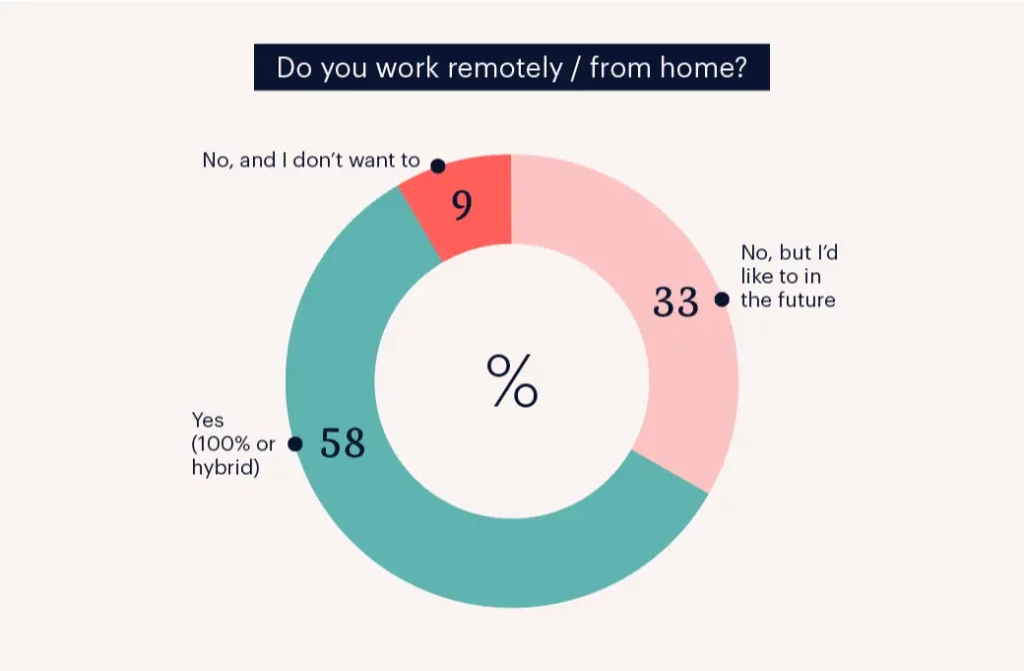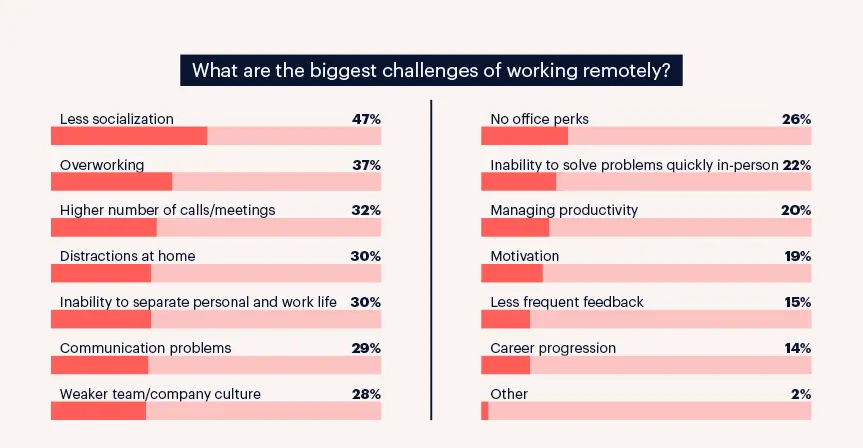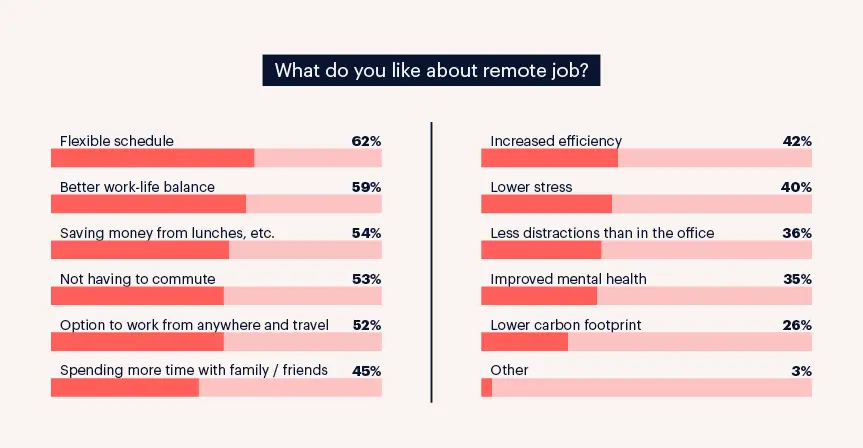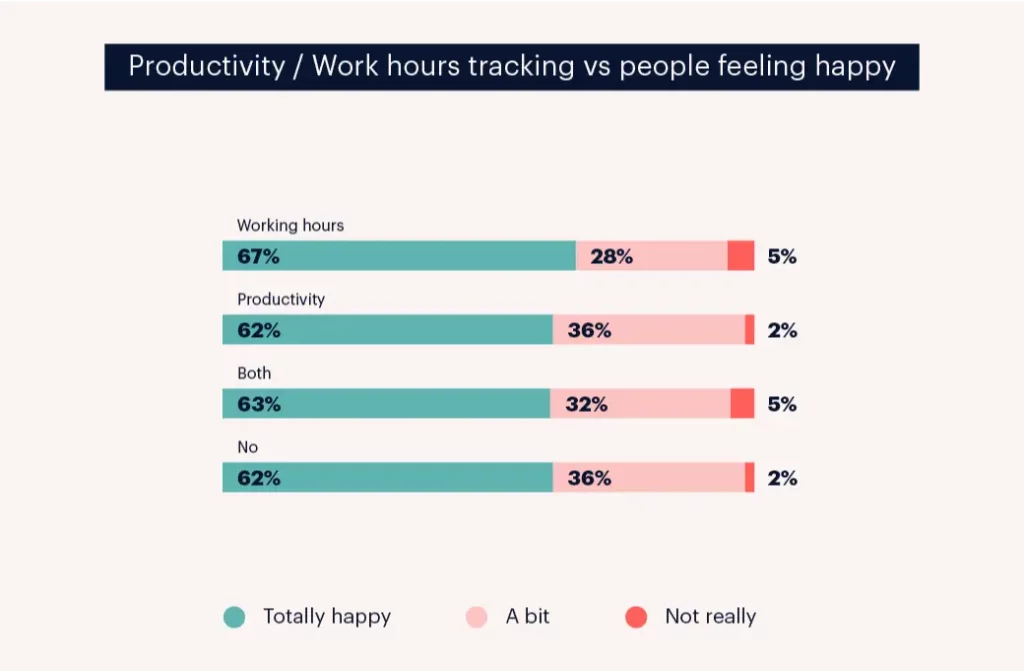Agreeing on a remote work setup with your employer can be a game-changer — for both your career and work-life balance. But negotiating the subject with your manager can be challenging.
Your boss may have questions over the feasibility of carrying out your role from home, have concerns around communication, or even question your ability to stay self-motivated while in a different location to the team.
To ensure negotiations go in your favor, it’s crucial that you’re prepared. This means assessing your own suitability for remote work, or researching the benefits of remote work and the company's existing policies on the matter.
In this article, we’ll help you understand more about the current remote work landscape while sharing tips for negotiating a remote work setup.
Understanding the remote work landscape
Remote work is no longer a mere trend; it's a full-blown revolution, and it’s here to stay. In recent years, we’ve seen a global shift in work culture combined with advancements in technology.
As a result, the concept of remote work has expanded beyond traditional boundaries.
Now it's possible to be connected all the time with your virtual teams: thanks to cloud based collaboration tools you can share all sorts of data with them, and with video conference software or an IP phone number it could be as if you never left the office.
What started as a way for businesses to stay afloat during the pandemic has changed into a new way of working. Whatever industry you work in, remote and work-from-home jobs continue to rise.
Our Beyond Remote Work 2022/2023 survey shows that 58% of surveyed workers are already in a remote work setup or hybrid model, while 33% would like to work from home in the future.

With the way things are going, these numbers are only going to rise. Statistics like these make a very compelling point when negotiating a work-from-home contract, but let’s take a closer look at the benefits of remote work.
Benefits for employees and employers
Why is remote work so appealing?
For employees, it means ditching the daily commute, a better work-life balance, and a personalized work setting that has the real potential to boost focus, motivation, and productivity.
But it’s not just employees who crave more remote work opportunities because of their huge benefits — employers are uncovering exceptional advantages, too. For example, by hiring staff, companies can access a larger talent pool, increase employee satisfaction, and reduce overhead expenses.
Keep these advantages in mind as you read through our tips on how to negotiate a remote work setup with your employer.
How to successfully negotiate a remote work setup
Before you start preparing for your negotiations, it’s vital to get clarity on a few aspects. Here are a few fundamental things you should consider ahead of your formal request:
1. Assess your remote work suitability
Remote work isn't for everyone, but with the right set of skills, you can thrive in this environment.
Before negotiating a remote work contract, you should assess your remote work suitability. Essentially, this means asking yourself a few crucial questions, including:
- Are you ready for remote work?
- Do you have what it takes to succeed at your job outside a physical workplace?
Also, reflect on your strengths and weaknesses to determine if remote work aligns with your career aspirations:
- Can you motivate yourself to work when you have the couch and TV in the next room?
- Will you find your children or pets distracting when trying to complete important deadlines?
Self-discipline, effective communication, and adaptability are essential traits of a successful remote worker.
If you don’t feel ready for remote work just yet, you can take an online course to help you lay the groundwork.
2. Be prepared to face fresh challenges
Remote work comes with its own set of challenges, but don't let them discourage you! With the right strategies, you can overcome common hurdles like time management, isolation, and communication barriers.

The key is to be aware of the challenges you might face, considering hurdles that are applicable to all remote workers as well as ones specific to your role.
For example, if your role requires regularly communicating with clients, downloading and sharing large files, or joining lots of video calls, you might need to consider what technology you’ll need to support these tasks at home.
With that in mind, you might consider the following:
- Can your current wi-fi support daily online activities or will you need to upgrade it, especially when using a VPN?
- Which of the different types of telephone systems would work best to maintain the communications channel opened with clients?
- Do you need to ask for a budget to invest in a new laptop or extra screens?
- Do you need additional tools such as a webcam for joining remote video calls?
- Will you need any remote access VPN or tools that allow you to view and edit documents from wherever you're working?
Remember, although there are challenges that come with remote working, there are also many upsides.
If you can face these challenges head-on and move past them, you'll improve yourself and your working capabilities. These skills can then be added to your resume for future opportunities.
3. Investigate remote work options at your workplace
Before you invest time and energy into crafting your remote work “pitch”, you’ll need to find out whether your current employer does, in fact, offer any remote work arrangements at all.
It’s very unlikely that companies will say “no” to any and all requests for remote work. Nonetheless, there may be some limits to what your employer can offer you.
For example, they might be happy with you working remotely, but only for some of the time. They might want you in the office for specific meetings and in other circumstances that would require your physical presence at their location.
In other cases, your current job role may simply be unsuitable for remote work. If you think this might apply to you, it may be best to reconsider your request and start looking for remote opportunities elsewhere.
4. Research the benefits of remote work
Another essential thing to take care of while you’re preparing your solid case for remote work is researching the subject thoroughly.
Make sure you spend some time reading about the pros and cons of working remotely, as well as the benefits for both employers and employees.
The more information you have on remote working, the more value, expertise, and knowledge you can bring to the table during your negotiation.
Ultimately, this lets your employer understand that you don’t simply want to work remotely because it seems to be “trendy” right now, but that you have looked into it in-depth and are fully aware of both its challenges and its opportunities.
With that in mind, here are a few top benefits that remote workers cited in our remote work survey:
- An overwhelming majority of remote workers (97%) said that they are either totally happy or at least a bit happier now that they work from home.
- Most workers (67%) feel more productive working remotely compared to in the office.
- The top reasons remote workers enjoy working from home are a flexible schedule (62%) and better work‑life balance (59%).

5. Articulate your value as a remote worker
During negotiations, make a strong case for yourself as a valuable remote team member.
Share any previous success stories, metrics, and achievements to demonstrate your capacity to contribute to the company's success while working remotely.
If you’ve been working for the same company for many years, chances are that you’ve already done some sort of remote work for them. Highlight the positives of those situations and build on those successes by proposing a fully-remote setup.
6. Communicate your motivation
Speak from the heart when expressing your passion for remote work. Share your vision of achieving a work-life balance and gaining flexibility, while still maximizing your productivity.
Don't just list off reasons why working from home is better for you: make some solid points around how remote working could help you do amazing things for the business while still being able to thrive in your personal life.
Perhaps you want to put your role as a parent at the forefront of your life, but don’t want this to affect your career. Parents who work from home can often see their kids for longer before bedtime, which can strengthen their family relationships.
All managers know that a happy employee is a hard-working employee. This is just one of many reasons why remote working can be better for employees and employers.
7. Nail the negotiation
Once you've fine-tuned your points, it's time to start the negotiations.
Pick the right moment
Timing is key, so choose a suitable moment to initiate the conversation around your remote work negotiations. A time when your performance is at its peak and your employer is available for a discussion will increase the likelihood of a positive outcome.
Communicate clearly and confidently
Approach the negotiation with confidence, having already practiced the main points that we discussed earlier.
Communicate your desire to explore remote work opportunities without sounding demanding. Active listening and open communication will set the tone for a productive dialogue.
With that in mind, here’s how you might frame your pitch:
Ease employer apprehensions
Understand that your employer might have reservations about remote work.
Address common concerns such as communication, productivity, and teamwork. Offer potential solutions that address these concerns and demonstrate your willingness to find a suitable arrangement.
For instance, research shows that more than half (53%) of remote workers are required to track their work hours and productivity. Interestingly, the majority of those workers said that this didn’t impact their happiness or satisfaction.

Tracking employees isn’t a new concept. In fact, it’s a key part in certain industries and organizations where tracking KPIs and metrics such as lead generation is crucial to the team’s success.
To put your employer’s mind at ease, you might suggest using time-tracking software such as Toggl to provide transparency, commiting to a daily check-in using a platform like Basecamp, or joining a team management and collaboration platform like Monday.
Key takeaways: Negotiating your remote work setup
While dreaming about achieving a level of work-life balance that’s right for you, you might have thought that working from home was simply that: a distant dream.
But with our guide to negotiating a remote work setup with your employer, you’re more likely to come to an agreement that works for both of you.
Remember, preparation is key. So while you may feel inspired after reading this, keep a few things in mind before you shoot off an email to your manager:
- Ask yourself whether your personality, traits, and skills make you the right candidate for a remote setup.
- Research the benefits of remote work for both you and your employer, as well as the company’s existing policy on flexible working.
- Think realistically about the challenges that come with working from home.
- Communicate your value and motivation with your employer so they understand your reasons for wanting to work remotely. You want to demonstrate that you’re still committed to the team and organization.
- Arrange a negotiation meeting to make your case with confidence!
Now, you're all set to make your work-life balance dreams come true through a new remote work setup that will turn you into a happier, more efficient, and more loyal employee, as well as a more fulfilled person.



